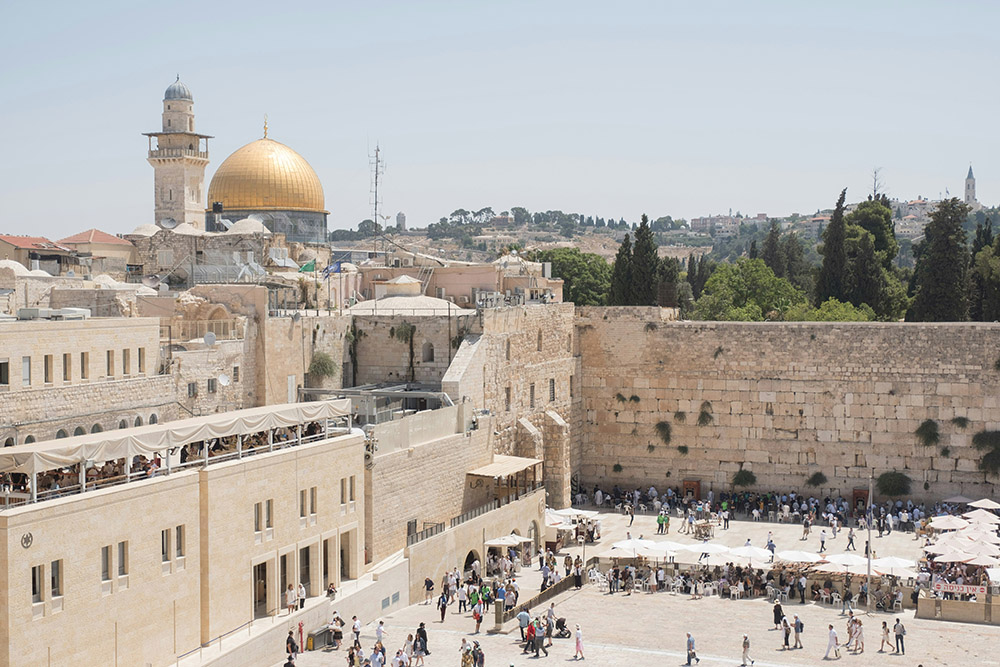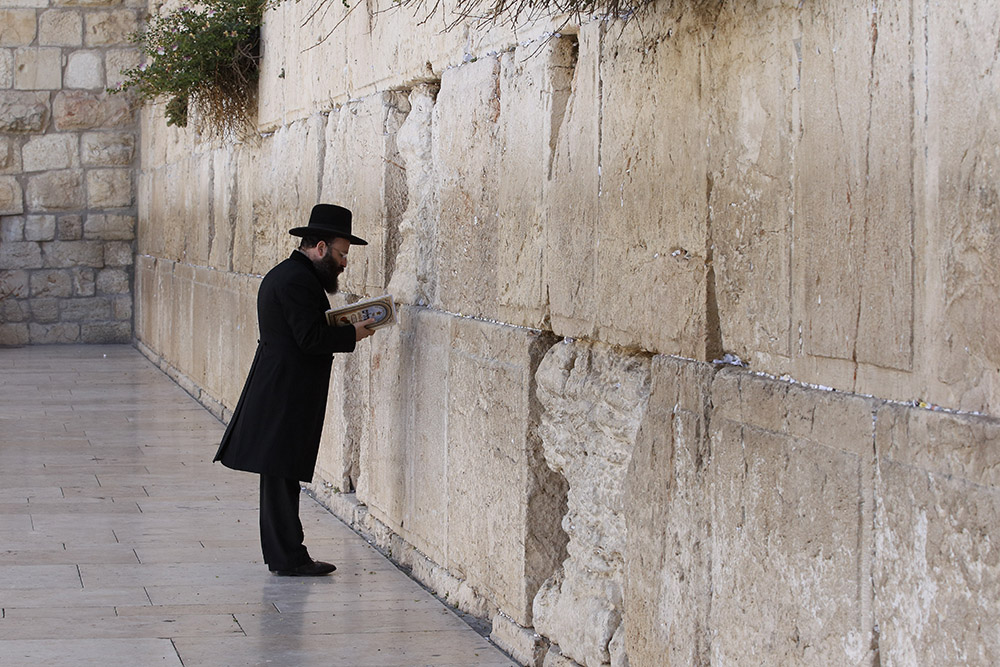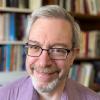
The Western Wall and the Dome of Rock in Jerusalem. (Unsplash/Anton Mislawsky)
I am on pilgrimage in the Holy Land with a group from my parish. It's close to noon, with hot sun and clear skies. We exit our bus and join hundreds of people walking to the Western Wall. Sounds swirl: drums and shofars, chanting and clarinets. Men in kippahs carry chuppahs; under each is a teenage boy. Today is Monday, and our guide tells us that on Mondays and Thursdays, bar mitzvahs may be celebrated at the Wall.
There are many Christian pilgrims, groups from Ghana and France and Canada and the States, Japan and Vietnam and Korea. Orthodox Jewish men in black suits. Some wear yarmulkes, others more elaborate kippahs, indicating their sect. The noonday sun glares, strong and unforgiving.
Two lines form to get to the Wall: one for women, one for men. Men's heads must be covered. I am not wearing a yarmulke, but a khaki sunhat; relief from the sun, but much more importantly, respect for the Lord as according to the custom. The Wall looms. I carry a parishioner's prayer, given to me so that it may be inserted into the stones of the Wall.
Advertisement
I stop. Look. Breathe. Listen. Close by is a bar mitzvah. Men sing as a drum beats time. Near that bar mitzvah is another. More music, and cheering. Around me, dozens of men stand. Some kneel. Men's hands touch the wall, men's heads bow.
One man looks ancient. White-bearded, long-haired, black-suited, he keens his prayer, wailing to the Lord, his gnarled hands bent and misshapen, caressing the stones. He seems to come from the past; but then again, as we are told, the past is never dead. It's not even past.
A low, slight gust; a measure of relief from the heat. I wedge the scrap of prayer into an opening between the stones. It almost falls out and I push harder until it is secured, safe, ensconced in the wall, joining its siblings in mute appeal to the Lord.
I pray this prayer is fulfilled.
I want to open myself to all that is around me. Is God speaking? What is God saying? I hear a clarinet, notes in a major key, with minor grace notes. Chanting. Men around me, muttering prayers. Snatches of English and Hebrew. An Asian language. An African one.
I pray, too. I think about where our group has been, to churches and shrines, Roman ruins and ancient cities. We have sailed on the Sea of Galilee. We have walked where Jesus walked.
I want to open myself to all that is around me. Is God speaking? What is God saying?
And, unexpectedly: an interior tug. I am here as a Catholic Christian, but I was not born into the faith. Despite having a Jewish father and a Russian Orthodox Christian mother, I was raised in no religion, never baptized, never had a bar mitzvah. Technically I am not even a convert, because I did not have a religion to convert from. Nevertheless, the word will serve, if only because my heart has changed and softened and opened, a conversion of self from cynicism and indifference ⎯ well, at least not as much as I used to have.
I close my eyes and place my hands on the stones, centuries-smooth from stroking and weather and wear. My ancestors stood here, right here, in this place. Jews who glorified the Lord and gave homage and praise. Jews who survived occupation and oppression. Jews who, in their doubt and worry, feared that the Lord did not hear them, had abandoned them. And despite their fears and frailties, despite those who hated them for no other reason than their being Jews, they came in faith and prayed. I lean my forehead onto the Wall in thanks and awe. I am moved to pray the Shema, "Hear O Israel, the Lord our God, the Lord is one," to honor my ancestors. To honor God.
For a long while I stand, unmoving, eyes still closed, rooted to my spot not only in space, but in time. Surrounded by sound. And, in this time out of time, the sounds are all that exist. Not otherworldly, but the real world, the drums, the shofars, the clarinets, the chanting. The incessant voices, buzzing, humming, singing, chanting.

A man prays at the Western Wall in Jerusalem in this May 26, 2014, file photo. (CNS/Paul Haring)
There have been voices here for thousands of years. All my forebearers who came to this Wall; but also those who could never come because they were exiled, feared, hated, persecuted, killed. Because, and only because, they were Jews.
I think of those who did the persecuting. Many were Christians, Catholics whose faith I converted to and now share. My Russian Cossack ancestors who might have slaughtered a Jew as easily as slaughtering an animal. This, too, is part of who I am. I contain both the slaughtered and the slaughterer.
I am saddened.
Within me lives the DNA of killers. And that is true not only of me, but of every human person in the world. Some came to grips with it long ago and have found a way to live in hope and harmony. Others have embraced the hatred and use it as their touchstone, their reason for living. Never excising the pain, the evil of the past remains toxic and poisonous. Never acknowledging the sin, the pain, the death that comes with hate.
I think of Jesus, who would respond with love, as well as all who wish to erode the jagged rocks of hatred. Toward a better way, with hope and peace for all.
The past may never be dead; it may not even be past. But the past, however alive, does not have to dictate the future. Love can transform.
I shake myself and open my eyes. Whisper an "Our Father." Rejoin my group. We leave the Wall as our pilgrimage continues to other places, other sites and eventually, back to the United States.
And the Wall remains, in Jerusalem and in my heart.





